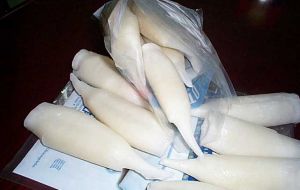MercoPress. South Atlantic News Agency
Argentina reports terrible squid season and lack of data on resource evolution
 This year’s season only landed 61.294 tons of Illex
This year’s season only landed 61.294 tons of Illex The squid (Illex argentinus) season in Argentine waters closed with one of the worst records in recent history. Official statistics reveal that 61,249.4 tons were landed between January 1 and September 4, equivalent to 24.3% of the 251,892.7 tons landed between January and September 11 of 2008.
The 75.7% fall intensifies the national squid sector crisis, which has also been exacerbated by the downturn in international markets, according to Argentina’s Secretariat of Agriculture, Livestock, Fisheries and Food (SAGP&A).
Mar del Plata landed the highest volume 42,091 tons of squid through, followed by Puerto Madryn with 13,123.8 tons; Puerto Deseado 3,324.9 ton and 1,228.5 ton in Comodoro Rivadavia.
The jigger fleet landed 50,700.2 tons of squid; fresh fish vessels, 5,352.5 tons; while 5,080.5 tons were unloaded by trawlers, among other vessels.
Harvest figures outside the exclusive economic zone (EEZ) also indicate poor results. Preliminary estimates disclose that between weeks 1 and 18, approximately 60,000 tons of squid were captured; whereas 3,500 tonnes more were landed in the North area, Pescare reports.
Forecasts for the future are also worrisome because scientists lack sufficient data to project the evolution of the resource. To date, assessment cruises of the North-Patagonic Buenos Aires stock and estimates of juvenile abundance indices for Spring Spawning Stock have not been undertaken.
The research cruises were suspended “because of the limited availability of the BIP Dr. Eduardo Holmberg during the first seven days of the month of April”, according to Technical Report 33/09 from Argentina’s National Institute for Fisheries Research and Development.
Similarly joint assessment cruises with Falkland Islands and British scientists were unilaterally cancelled by the Argentine government. (FIS/MP).-




Top Comments
Disclaimer & comment rulesCommenting for this story is now closed.
If you have a Facebook account, become a fan and comment on our Facebook Page!